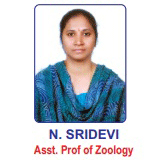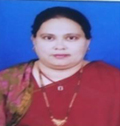1. About the Department
� The Department of Zoology was established in the year 2018, with 50 students.
� The course is offered in combination with Botany and Chemistry.
� The medium of instruction is English.
� The department has a laboratory, with basic equipment.
� The Department has two faculty members (Regular) and a record assistant.
� The course has good demand with more than 90% enrolment rate
� At present the department is offering three programs, BZC, BZCA, and BZCs.
2. Vision:
� To inculcate amongst the students the highest values of life, respect for Nature and to inculcate sound acquisition of knowledge of animal sciences through quality educational practices and research.
3. Mission:
� The primary objective of the department is to impart quality education in the subject of Zoology as a basic science and its applied branches.
� To encourage Higher education & research in zoology.
� To provide quality education offering skillbased programs and motivate the students for selfemployment in applied branches of Zoology.
� To inculcate the spirit of resource conservation and love for nature.
� To provides opportunities for professional and personal development through curricular and co- curricular activities.
�
4. Objectives
� To facilitate Higher education & research in zoology.
� To provide quality education offering skill based programs and motivate the students for self employment in applied branches of Zoology.
� To inculcate the value based education and entrepreneurial skills among the students.
S.No |
Name |
Designation |
Qualification |
Photo |
Curricullum Vitae |
| 01 | Smt. N. Sridevi | Assistant Professor of Zoology | M.Sc, Zoology,Entomology Gold Medalist,APSET |  |
View CV |
| 01 | Ms. IshrathSulthana | Assistant Professor of Zoology | M.Sc, Zoology |  |
View CV |
S. No |
Programs |
Year of commencement |
Level |
Duration |
|
1 |
B Sc BZC |
2018-19 |
UG |
3years |
|
2 |
B Sc BZCA |
2019-20 |
UG |
3years |
|
Staff Achievements
S.No. |
Name of the training programme/Courses attended |
Name of the sponsoring agency |
Place and Date |
National workshop on “Innovative teaching: A Virtual Lab approach” |
St. Pious X Degree and PG College for women, Nacharam, Hyderabad |
29.08.2018 |
|
2. Online seven days International Faculty Development Programme on “Impact of Covid-19 on Higher Education Institution’s Challenges and Responses”,. |
Organized by Hindusthan College of Arts and Sciences, Coimbatore, Tamilnadu |
16th May to 22ndMay 2020 |
|
Two weeks faculty development programme on “Managing online classes and Co-creating MOOCS:2 |
Ramanujam College, Delhi University. |
May18th – June 3rd, 2020 |
|
One-week Faculty Development Programme on “Open Source Tools for Research” |
Ramanujam College, Delhi University. |
June 8th to June 14th 2020. |
|
Refresher Course in Life Sciences- |
UGC-HRDC, Academic staff college, O.U. Hyderabad |
03-01-2022 to 18-01-2022 |
Students achievements:
Student Progression:
| K.MonikaAishwarya | BSc(BZC) |
University College for Women, Osmania University |
M.Sc(Chemistry) |
K.AtmaCharan Reddy |
BSc(BZC) |
University College of Science, Osmania University |
M.Sc(Chemistry) |
K.Aravind |
BSc(BZC) |
Keshav Memorial College |
M.Sc(Chemistry) |
Yamini |
BSc(BZC) |
Jahnavi College |
M.Sc(Botany) |
Student Placement:
| T.Sailikhitha | BSc(BZC) |
Service consultant at Ayannar Marketers Pvt. Limited |
B.Swathi |
BSc(BZC) |
Service consultant at Ayannar Marketers Pvt. Limited |
T.Shekhar |
BSc(BZC) |
JUNIOR PRODUCT EXECUTIVE-SALES & MARKETING, Shri Ram City |
UGC –SERO, completed and submitted in the year 2018 Title-“Influence of Natural products on Stored Grain Pests”.
Dated April/2017-ISSN 3456-6683.
Best out of Waste
Objective of the practice:
The Context
The Department of Zoology is established in the year 2018. It has been felt that the teaching-learning can be enhanced by showing the models. However, due to the paucity of the funds and non-availability of the models in the market it has been difficult to implement this objective. Therefore, the Department has taken an initiative to motivate the students to prepare models from the available waste.
Practice
Evidence of Success
Problems encountered and resources required: